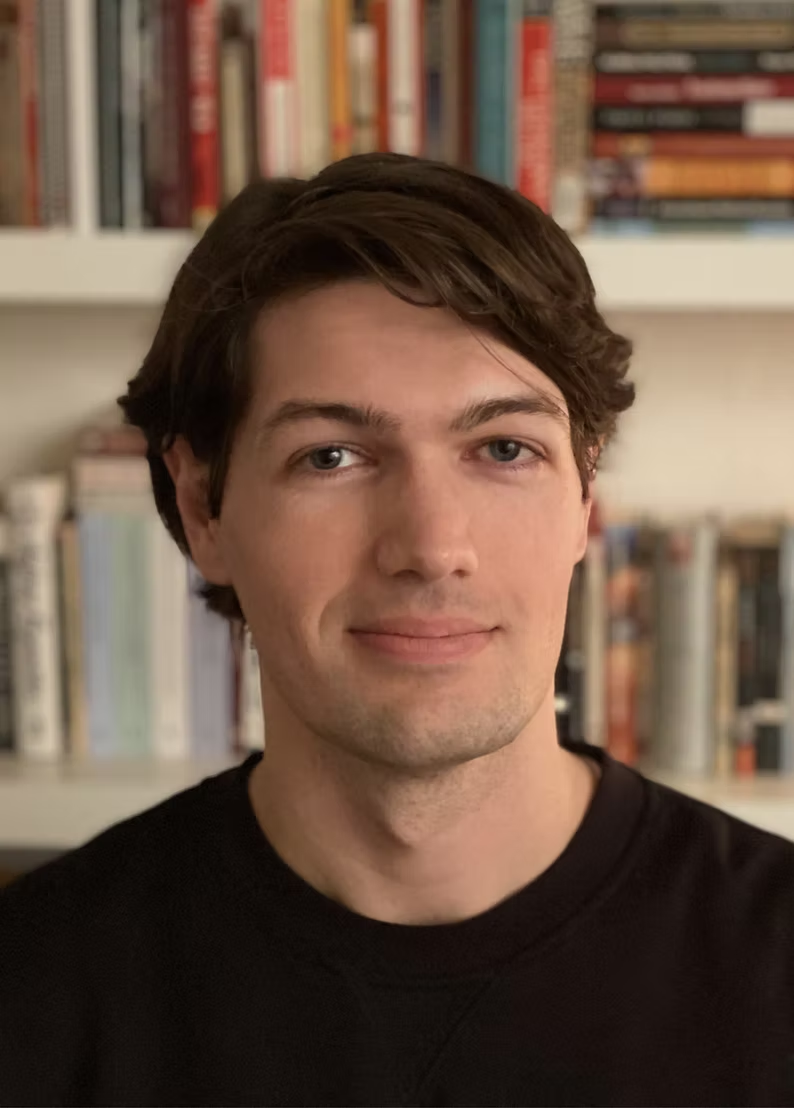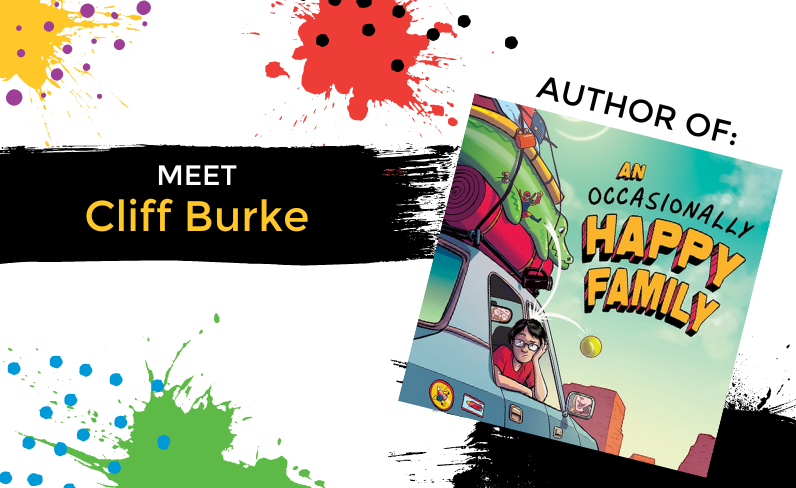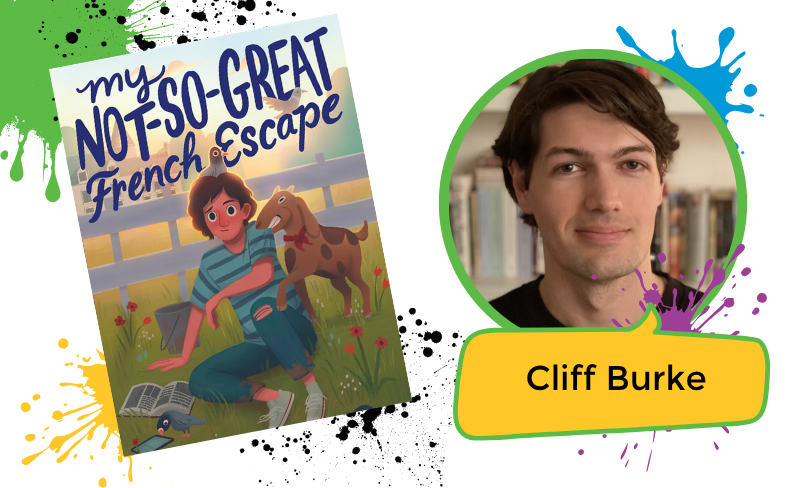Hello Inklings!
This month’s Ink Splat Author Interview features Cliff Burke, author of An Occasionally Happy Family and My Not-So-Great French Escape.
In our interview, we discussed how he creates humorous books based on real world situations, how he balances humor with more heartfelt scenes to craft interesting character arcs. Also, we discussed Cliff’s favorite part of the writing process–editing–and how it can be one of the most rewarding parts of the writing process. How might we approach revision creatively and with an experimental frame of mind?
Learn more about Cliff at cliffburke.com.

Writing Challenge
In our conversation with Cliff Burke, we talked about noticing funny situations in our real lives, like when he noticed the bored kids on a school trip to Old Faithful in Yellowstone National Park, and using them to spark fiction.
PROMPT:
Think of a situation you saw that made you laugh out loud. Who was involved? What was so funny about it to you?
Now, imagine how you might transform that real-world scenario into fiction. Remember, with fiction, you can change anything you would like. You can move the scene to a fantastical world, exaggerate the characters or their relationships, or simply change a few key details to make the moment your own.
Write this funny moment as a scene, with dialogue, action, and a fully-realized setting. When you have a working draft, remember Inklings members can share their work-in-progress on the Inkwell for feedback from their Inklings community! Click the button below to post.
If you’re not a member yet, click the button below to learn more about how membership works. We’d love to celebrate your voice as part of our Inklings community.
Remember, the Inklings community isn’t only a place for sparking ideas. We’re also here to help you cultivate your skills as you try out challenges like this one on your own, or with us in a workshop, camp, or 1:1 mentorship. Plus, you’re always invited to share your one-of-a-kind voice, too. Inklings members can share their writing on our Inkwell app any time, and we also offer a range of publishing programs. Whatever your next creative step is, we’re cheering you on!
A: I started seriously writing, as in writing with the goal of sending a finished book to agents and editors, when I was a sixth-grade writing teacher in Texas. My mentor teacher ran a dynamic writer’s workshop model in her classroom, where students regularly wrote, peer edited, revised and took pieces of writing through multiple drafts. I started a version of this for my own classroom, and opened every class with 10 minutes of reading and then a little bit of writing. As students were writing, I would also write by hand and project what I was writing on the board.
I had read that the best writing mentor texts are just above the ability level of students but not so far beyond that they find it impossible, so I would try to pitch my writing in this zone, and students seemed to like it, especially when it was funny. I had written bits and pieces of what became An Occasionally Happy Family on the board and pieced it together on weekends and over the summer.
As for the topics, this is more a reflection of my taste and writing ability. I don’t think I could write a fantasy or mystery novel even if I wanted to, but I do know how to write about everyday situations and small shifts in people’s moods.
Q: Tell us about your inspiration for An Occasionally Happy Family. Did a character show up first, or the idea to write about a road trip? How did the story develop from that first spark?
The main character and general idea came at the same time, when I was sitting behind a school group on the benches to watch Old Faithful erupt. They were middle school kids who hated being at Old Faithful, hating waiting for it to erupt, and mocked how dumb it was when people were clapping afterwards. That was the first kernel of a kid who’s taken to a national park for a ‘special trip’ but has little interest in nature.
Once I had that original idea, I dug deeper into who the main character would be and why he would be on a trip that he isn’t excited about and developed the larger story of a family road trip where the dad is hiding a surprise for the first half of the trip.
Originally, the trip was going to be cross-country, from Texas to California, with ten stops at national parks along the way, but once I started writing, it took me 15,000 words to get from the opening page to the second day of their trip, so I decided to simplify and limit the story to the first park, the one closest to where the characters lived, Big Bend National Park.
A: This one was different in that it was more directly based on a real experience. When I was twenty-four, I spent a few weeks working on an organic farm in the French countryside and some of the characters and events are versions of what actually happened, though aged down and made into more composite characters.
My approach was also not the same as the first book since I was, in some ways, responding to the first book. I wanted to differentiate the narrator and make sure the voice was distinct. I still wanted the language to be authentic to a 12-13 year old, but a little more earnest, more open to experience. He wants to learn about French culture, and about the other people from around the world staying on the farm. The narrator is also, hopefully, more introspective and clear about his challenges and how he would like to try to overcome them.
Because the narrator was more open and wanted to connect with people, the way he views other people is also more positive. Unlike the first book, it is also a little less overtly comedic, so there is more time to develop the characters and less looking to hit as many jokes as possible per page.
A: Editing is definitely my favorite part. As above, I like the start of drafting, but it does become a pain for me when I need to get to the end and I know that a lot of what I’m writing isn’t very good. And isn’t even always writing; it can become typing and leaving brackets like, [emotional convo here].
But once I have something on the page, then I can hone in, try to figure out what I need each chapter to be, read sentence by sentence and start to see real, slow improvements in the story.
I also like working with professional editors. After I have read and re-read and written and re-written scenes so many times, it’s so helpful to have someone else come up and just delete a paragraph and replace it with a few words. Or to highlight areas that could use a different character response, or where there could be more leaning into an emotion. I encourage young writers to always get multiple readers for a piece of writing, because even a single suggested change from someone can have a major impact on your finished writing project.
Q: When you’re feeling creatively sluggish, what do you do to shake new ideas loose?
A: I think it’s mostly a matter of awareness. There are times when I know that I need a break and don’t feel very inspired and then there are times where everything that crosses my path–a newspaper article, something I overheard on the subway, a sentence in a magazine–seems like a story.
I have learned from having enough sluggish periods that you don’t need to panic. You won’t run out of ideas. And when you do have a flush of ideas, when you are on fire and everything you see seems like it could be a character detail or a line of dialogue or a story, record them in some way. I take pictures of everything with my phone. I have all these random science facts screenshotted in my photo library. And I regularly email one-sentence story ideas to myself so I always have a repository to go back to when I need it.

A special thank you to Cliff Burke for sharing with us!
Cliff Burke grew up in the suburbs of Cleveland, Ohio. He worked as a house painter, a parking lot attendant and a sign-twirling dancing banana before graduating from the College of William & Mary. Since then, he has taught reading and writing in China, Hong Kong, the United Kingdom and the United States. His first novel, An Occasionally Happy Family, was a 2022 Spirit of Texas Book and selected for several state reading lists. His latest novel, My Not-So-Great French Escape, was released in March 2023.
Cliff is represented by Jim McCarthy at Dystel, Goderich & Bourret. Learn more about Cliff at cliffburke.com.
Check out An Occasionally Happy Family, My Not-So-Great French Escape, and all of our recent Ink Splat authors’ works at our Bookshop.org Store.

INKLINGS CONNECT
Fall Creative Writing
Join us for a Writers Circle, 1:1 Mentorship, or Publishing Program this fall. We can't wait to see what you create!
Keep your creativity flowing with our upcoming community events:

SUBSCRIBE




